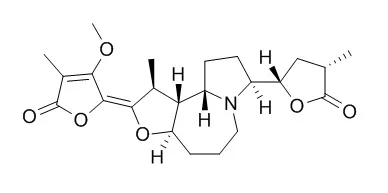| Description: |
Protostemonine has anti-inflammatory activity, it effectively attenuates LPS-induced inflammatory responses in vitro and in vivo; the beneficial effects are associated with the decreased phosphorylation of MAPK and AKT and the reduced expression of pro-inflammatory mediators, such as iNOS, NO and cytokines. Protostemonine shows significant antitussive activity in a citric acid-induced guinea pig cough model following peripheral administration. It attenuates LPS/GalN-induced acute liver failure and upregulating HO-1 expression is implicated in its hepatoprotective activity. Protostemonine shows strong nematicidal activity against Panagrellus redivevus, with the IC50 value of 0.10 uM. |
| Targets: |
p38MAPK | Akt | NOS | NO | TNF-α | IL Receptor | HO-1 | Nrf2 |
| In vitro: |
| Acta Pharmacol Sin. 2018 Jan;39(1):85-96. | | Protostemonine effectively attenuates lipopolysaccharide-induced acute lung injury in mice.[Pubmed: 29047459 ] | Protostemonine (PSN) is the main anti-inflammatory alkaloid extracted from the roots of Stemona sessilifolia (known as "Baibu" in traditional Chinese medicine).
METHODS AND RESULTS:
Here, we reported the inhibitory effects of PSN on lipopolysaccharide (LPS)-induced macrophage activation in vitro and LPS-induced acute lung injury in mice. Macrophage cell line RAW264.7 cells and mouse bone marrow-derived macrophages (BMDMs) were treated with PSN (1, 3, 10, 30 and 100 μmol/L) for 0.5 h and then challenged with LPS (0.1 μg/mL) for 24 h. Pretreatment with PSN significantly inhibited LPS-induced phosphorylation of MAPKs and AKT, iNOS expression and NO production in the macrophages. C57BL/6 mice were intratracheally injected with LPS (5 mg/kg) to induce acute lung injury (ALI). The mice were subsequently treated with PSN (10 mg/kg, ip) at 4 and 24 h after LPS challenge. PSN administration significantly attenuated LPS-induced inflammatory cell infiltration, reduced pro-inflammatory cytokine (TNF-α, IL-1β and IL-6) production and eliminated LPS-mediated lung edema. Furthermore, PSN administration significantly inhibited LPS-induced pulmonary MPO activity. Meanwhile, LPS-induced phosphorylation of p38 MAPK, iNOS expression and NO production in the lungs were also suppressed.
CONCLUSIONS:
The results demonstrate that PSN effectively attenuates LPS-induced inflammatory responses in vitro and in vivo; the beneficial effects are associated with the decreased phosphorylation of MAPK and AKT and the reduced expression of pro-inflammatory mediators, such as iNOS, NO and cytokines. These data suggest that PSN may be a potential therapeutic agent in the treatment of ALI. | | Planta Med. 2009 Feb;75(2):174-7. | | Alkaloids from roots of Stemona sessilifolia and their antitussive activities.[Pubmed: 19031364] | Protostemonamide ( 1), a new Protostemonine-type alkaloid, and 12 known compounds were isolated from the roots of Stemona sessilifolia.
METHODS AND RESULTS:
Their structures were elucidated by 1 D and 2 D NMR spectral and other spectroscopic studies. The main alkaloidal constituents, Protostemonine ( 2), stemospironine ( 4), and maistemonine ( 7), showed significant antitussive activity in a citric acid-induced guinea pig cough model following peripheral administration; stemonamine ( 11) had antitussive activity following i. c. v. administration. |
|
| In vivo: |
| Int Immunopharmacol. 2015 Dec;29(2):798-807. | | Protective effects of protostemonine on LPS/GalN-induced acute liver failure: Roles of increased hepatic expression of heme oxygenase-1.[Pubmed: 26363973 ] |
Here, we explored protective effects of Protostemonine (PSN), on mouse acute liver failure induced by lipopolysaccharide/d-galactosamine (LPS/GalN).
METHODS AND RESULTS:
PSN dose-dependently declined LPS/GalN-induced lethality of mice as well as increase of ALT/AST activities in their serum. Hepatoprotective effects of PSN were also supported by liver histopathological examinations. After LPS/GalN treatment, severe oxidative stresses in the liver could be detected by boosted MDA and ROS as well as decreased GSH. Moreover, hepatic expression of pro-inflammatory cytokines, including TNF-α, IL-1β and IL-6, were sharply elevated. These symptoms were dose-dependently ameliorated by PSN. Mechanistically, PSN promoted the transcription and translation of heme oxygenase-1 (HO-1) in hepatocytes and liver Kupffer cells. Nrf2 is a master transcription factor contributing to the expression of HO-1. PSN elevated Nrf2 nuclear accumulation and enhanced Nrf2/HO-1 promoter interaction. Suppressing enzyme activity of HO-1 by co-treating mice with HO-1 inhibitor ZnPP abolished protective effects of PSN. ZnPP also abrogated alleviative impacts of PSN on LPS/GalN-mediated hepatic oxidative stresses and inflammatory responses. Finally, we showed that PSN exhibited undetectable toxic effects on vital organs of mice.
CONCLUSIONS:
Our findings suggested that PSN is able to attenuate LPS/GalN-induced acute liver failure and upregulating HO-1 expression is implicated in its hepatoprotective activity. |
|






 Cell. 2018 Jan 11;172(1-2):249-261.e12. doi: 10.1016/j.cell.2017.12.019.IF=36.216(2019)
Cell. 2018 Jan 11;172(1-2):249-261.e12. doi: 10.1016/j.cell.2017.12.019.IF=36.216(2019) Cell Metab. 2020 Mar 3;31(3):534-548.e5. doi: 10.1016/j.cmet.2020.01.002.IF=22.415(2019)
Cell Metab. 2020 Mar 3;31(3):534-548.e5. doi: 10.1016/j.cmet.2020.01.002.IF=22.415(2019) Mol Cell. 2017 Nov 16;68(4):673-685.e6. doi: 10.1016/j.molcel.2017.10.022.IF=14.548(2019)
Mol Cell. 2017 Nov 16;68(4):673-685.e6. doi: 10.1016/j.molcel.2017.10.022.IF=14.548(2019)